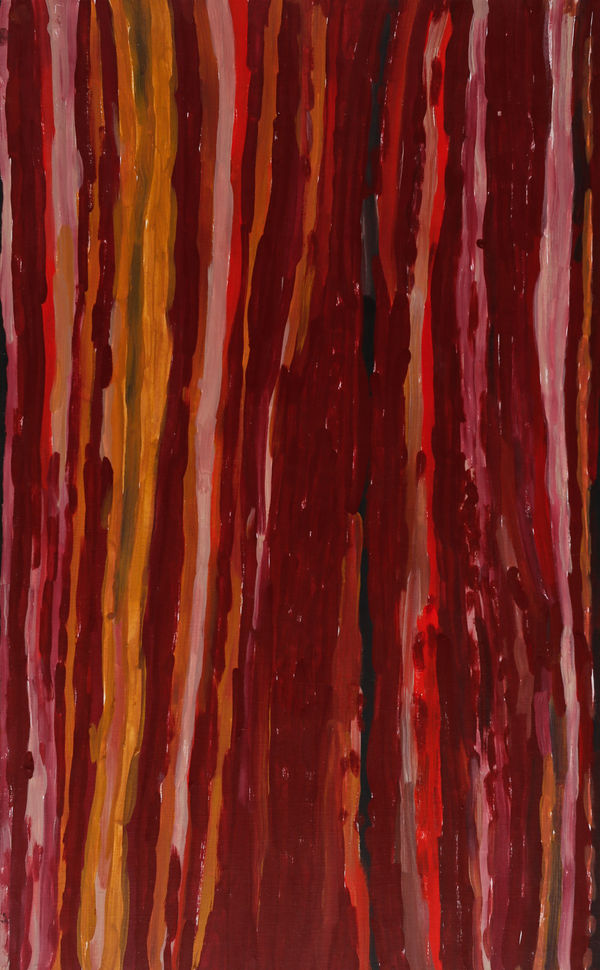-
-
“When Maisie Petyarre Bundey settles down to paint each morning, regardless of the dogs, donkeys, heat or art center chat, nothing alters her deep concentration. Borne from traditional knowledge, Maisie paints with a confidence and urgency like no other, her subject matter drawn from acute observation and memory. Maisie’s painting style is linked to her foundational experience in making batik, and the loose fluid liberation that this technique allows. Once completed, the painting is pushed aside and never acknowledged by the artist, her sights quickly fix on the cup of tea and oranges that await her.”[i]
Sharing her painting time between Arlparra and Ampilatwatja both the Artists of Ampilatwatja and the Utopia Art Centre welcome Maisie into the fold when she is visiting.
Maisie has fond memories of growing up on Utopia Station and of working with the original group of Batik painters of Utopia. It was here in the late 1970’s that these women began expressing their Awley in new media. “Awely is the Anmatyerr term used for women’s songs and ceremonies. Women perform awely to look after Country, and to promote feeling of happiness, health and wellbeing. The Country in turn acknowledges these acts of mutual recognition.”[ii]
“Before the awely dancing begins the chest, breast and upper arms of the participants are ‘painted up’ using mixtures of ground ochres and other pigments…”[iv]Maisie now most often depicts the chest designs of the Anhelengkw (emu) Dreaming in her paintings.
There are also paintings of vertical and horizontal stripes, reminiscent of Maisie’s peer, Emily Kam Kngwarray’s later works.“The mark making in these stripe paintings is akin to the arlkeny striped body designs that are painted onto women’s bodies for awely ‘their gestural physicality involves the rhythm of ceremony.’”[v]
So, whilst Maisie’s works are deeply rooted in her associated Dreaming and Country, the dynamism and innovation of her canvas’ today possess a vitality and fluid temporality that visualises Dreaming, not as something only of the past, but also entirely of the present.
[i] Meagan Jacobs, Manager Artists of Ampilatwatja
[ii] Green, J. (2023). The life and legacy of Emily KamKngwarray. In K. Cole, J. Green & H. Perkins (Eds.), Emily Kam Kngwarray(pp. 155). National Gallery of Australia.
[iv] Green, J. (2023). The life and legacy of Emily KamKngwarray. In K. Cole, J. Green & H. Perkins (Eds.), Emily Kam Kngwarray(pp. 155). National Gallery of Australia.
[v] Quote from Hetti Perkins in: Gilchrist, S. (2023). Iam Kam. In K. Cole, J. Green, & H. Perkins (Eds.), Emily Kam Kngwarray (pp. 170). National Gallery of Australia.
-
-
 Maisie Petyarre BundeyAnhelengkw (Emu) Dreaming, 2025Acrylic on linen107 x 91 cmSold
Maisie Petyarre BundeyAnhelengkw (Emu) Dreaming, 2025Acrylic on linen107 x 91 cmSold -
 Maisie Petyarre BundeyAnhelengkw (Emu) Dreaming, 2025Acrylic on linen91 x 51 cmSold
Maisie Petyarre BundeyAnhelengkw (Emu) Dreaming, 2025Acrylic on linen91 x 51 cmSold -
 Maisie Petyarre BundeyAnhelengkw (Emu) Dreaming, 2025Acrylic on linen91 x 51 cm$ 2,100.00
Maisie Petyarre BundeyAnhelengkw (Emu) Dreaming, 2025Acrylic on linen91 x 51 cm$ 2,100.00 -
 Maisie Petyarre BundeyAnhelengkw (Emu) Dreaming, 2025Acrylic on linen91 x 51 cm$ 2,100.00
Maisie Petyarre BundeyAnhelengkw (Emu) Dreaming, 2025Acrylic on linen91 x 51 cm$ 2,100.00 -
 Maisie Petyarre BundeyAnhelengkw (Emu) Dreaming, 2025Acrylic on stretched paper40 x 50 cmSold
Maisie Petyarre BundeyAnhelengkw (Emu) Dreaming, 2025Acrylic on stretched paper40 x 50 cmSold -
 Maisie Petyarre BundeyAnhelengkw (Emu) Dreaming, 2025Acrylic on linen91 x 91 cm$ 3,750.00
Maisie Petyarre BundeyAnhelengkw (Emu) Dreaming, 2025Acrylic on linen91 x 91 cm$ 3,750.00 -
 Maisie Petyarre BundeyAnhelengkw (Emu) Dreaming, 2025Acrylic on linen122 x 76 cmSold
Maisie Petyarre BundeyAnhelengkw (Emu) Dreaming, 2025Acrylic on linen122 x 76 cmSold -
 Maisie Petyarre BundeyAnhelengkw (Emu) Dreaming, 2025Acrylic on linen122 x 76 cm$ 4,000.00
Maisie Petyarre BundeyAnhelengkw (Emu) Dreaming, 2025Acrylic on linen122 x 76 cm$ 4,000.00 -
 Maisie Petyarre BundeyAnhelengkw (Emu) Dreaming, 2025Acrylic on linen107 x 76 cm$ 3,100.00
Maisie Petyarre BundeyAnhelengkw (Emu) Dreaming, 2025Acrylic on linen107 x 76 cm$ 3,100.00 -
 Maisie Petyarre BundeyAnhelengkw (Emu) Dreaming, 2025Acrylic on paper56 x 76 cmSold
Maisie Petyarre BundeyAnhelengkw (Emu) Dreaming, 2025Acrylic on paper56 x 76 cmSold -
 Maisie Petyarre BundeyAnhelengkw (Emu) Dreaming, 2025Acrylic on paper56 x 76 cmSold
Maisie Petyarre BundeyAnhelengkw (Emu) Dreaming, 2025Acrylic on paper56 x 76 cmSold
-
-
Artist













